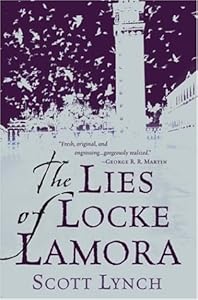 Enter a world built upon the ruins of an ancient, grand race of beings that have disappeared a millennia before. Men and women live upon the bones of another civilization, toiling away at making enough money to eat while praying to the Twelve that a plague doesn't strike their district, wiping out every adult within, leaving the children orphans and ripe for the pickings of slavers and the roving gangs.
Enter a world built upon the ruins of an ancient, grand race of beings that have disappeared a millennia before. Men and women live upon the bones of another civilization, toiling away at making enough money to eat while praying to the Twelve that a plague doesn't strike their district, wiping out every adult within, leaving the children orphans and ripe for the pickings of slavers and the roving gangs.
The Thiefmaker takes these orphans, and, as the name may suggest, makes thieves of them. As they grow and become proper thieves, they are sold to the disparate gangs of Camorr where they make a living as pickpockets and robbers. Thus enters Locke Lamora, seven, who the Thiefmaker immediately sells to the enigmatic priest Chains, the leader of the Gentleman Bastards, and the criminal landscape of Camorr changes forever.
Before I get into my actual feelings of this book, I would just like to say that I grew up reading fantasy. In elementary school my father gave me a copy of J.R.R. Tolkien's the Hobbit, and fell in love. A year or two later, I inherited a beaten but well-loved leather copy of the Lord of the Rings. I fell in love all over. For well over a decade I devoted myself to reading whatever fantasy novels I could get my hands on, while reading everything that Tolkien had ever written over and over again.
I then happened upon David Gemmell's Drenai Saga, and fell in love with heroic fantasy fiction. I consumed the host of books containing scores of violent anti-heroes, brooding men who were good only thanks to the soft touch of a woman.
Unfortunately, I grew tired of the genre after highschool, and became enamored with the works of Heinlein and his peers in the science fiction community. I know that this sounds like it has little to do with the story I have set forth to review, but I present my background in order to more clearly state my case.
the Lies of Locke Lamora is a breath of fresh air in a genre that falls again and again to a score of tropes set forth by Tolkien decades ago, and little improved upon. There is no hero here battling a grand evil, no brooding reluctant champion. Just a man that can't really fight very well, but was born with a silver tongue and a mind for mischief.
The city of Camorr, and the world that it inhabits, is pretty obviously based off of a late renaissance era Venice, and regularly makes reference to the Therin Throne, a fantasy-Rome. The city is built upon the ruins of an alien race that disappeared a thousand years before, leaving behind grand structures of unbreakable glass that humans have claimed as their own. Magic exists, but is rare and monopolized by a sect of mercenary-wizards. Alchemy is common-place, and allows for a great deal of interesting plant hybrids and chemical curiosities.
The world is richly detailed and a wonder to explore, but the concept is what really thrilled me. Locke Lamora and his group of Gentleman Bastards are confidence men in a world that is just discovering the concept. Trained from childhood to rob from the most rich, they go from one noble to the next spinning one lie upon another until they sit atop a mountain of gold. The plot is fascinating, and continually keeps you guessing.
If you like a story revolving around a smartass, immoral, overconfident jerk that still somehow sets out to do what is right for him and his own, this book is your ticket. It has a good sense of humor, a welcome detailed world to sink into, and a new twist on an old genre that kept me smiling throughout. Scott Lynch has spun a tale worthy of a seasoned veteran, and has well impressed me with this first attempt. I look forward to reading the next book, and eagerly await the next releases which have (unfortunately) been too long in coming. Though I do part with words of caution: if you are put off by foul language, foul action, and the thought of people being drowned in barrels of horse urine, then maybe this book isn't for you. But for the rest of us, in the words of the Gentlemen Bastards themselves:
To us, richer and cleverer than everyone else!
Rating: 9/10





